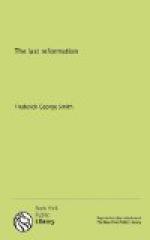Human ecclesiasticism has always been the greatest barrier to the free spiritual development of the work of Christ. According to that relic of the papal church, authority and rule is vested in the clerical corporation and is by them conferred upon other individuals by the act of ordination. How different the standard of the Word! In the Old Testament times the office of prophet did not come in the priestly line, but on whomsoever the spirit of prophecy descended—whether upon Amos, the herdsman, or David, the king—he spake as he was moved by the Holy Ghost. There has never been a time under the divine economy when any man to whom the Word of the Lord came was not divinely authorized to proclaim his message wherever he could get a hearing, whether in synagog or temple, or out under the broad canopy of heaven.
CHAPTER IX
THE CHURCH OF THE FUTURE
What about the church of the future? Is the modern sect system the ultimate goal of Christian attainment in this world? While the sects contain much truth and many of the people of God, their ecclesiastical constitutions are foreign to the true church of Jesus Christ, and it is inconceivable that the great Founder would make no provision either in his Word or in his plan for the correction of the evils which have grown up around the Christian system during the dark ages of the world and which have in a great measure perverted the gospel itself and lessened its wholesome efficiency as the universal remedy for human ills.
Since no sect can make good a claim to being exclusively the church of God, a general feeling of toleration at least (if not in all cases of sincere respect) has come to prevail respecting the different denominational churches. Men have come to look upon the sects as a mere matter of fact, not to be seriously questioned, and we are supposed to cover the whole scene with the mantle of patience and charity and make the best of a bad situation.
[Sidenote: The Protestant truce]
Dr. J.M. Sturtevant has expressed this general attitude so well that I shall quote his own words: “It has long been true in this country that no Protestant can freely expose the errors and superstitions of the papal church, especially from the pulpit, without incurring the charge of intolerance, bigotry, and uncharitableness. Religious controversy itself has been placed under the ban, as in its own nature uncharitable. When once any religious opinion has organized itself into a sect, it is thought to have acquired a sacredness which, in the name of Christian charity and in the interest of the tranquility of the community, defends it from any open assault. We have come into the condition in which Rome was when she had extended her conquests from the British Isles to the Euphrates and had transferred to Rome the divinities of all the countries conquered. People of every nationality might worship their own divinities, but must respectfully tolerate the worship of every other. In this way only could religious conflict be avoided. The chief reason why Christianity was persecuted was that from its very nature it could accept no such truce. It is either a universal religion or no religion at all. It is, like all other systems which claim to be the true, in its own nature exclusive.”




